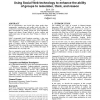62 search results - page 5 / 13 » Designing technology for people with cognitive impairments |
214
click to vote
SIGMOD
2009
ACM
16 years 2 months ago
2009
ACM
We are experiencing a new Social Web, where people share, communicate, commiserate, and conflict with each other. As evidenced by systems like Wikipedia, twitter, and delicious.co...
114
click to vote
CHI
2006
ACM
16 years 2 months ago
2006
ACM
In this paper, we describe the design and preliminary evaluation of a hybrid desktop-handheld system developed to support individuals with aphasia, a disorder which impairs the ab...
119
click to vote
PDC
2004
ACM
15 years 7 months ago
2004
ACM
We present experiences and insights into participatory design with individuals who have anterograde amnesia and therefore have extreme difficulty storing new memories. We discuss ...
127
Voted
PETRA
2009
ACM
15 years 8 months ago
2009
ACM
The Ambient Kitchen is a high fidelity prototype for exploring the design of pervasive computing algorithms and applications for everyday environments. The environment integrates ...
148
click to vote
W4A
2010
ACM
14 years 11 months ago
2010
ACM
Supporting effective and enjoyable Web usage by people with sensory, motor and cognitive impairments requires more than just accessible Web content. There is an additional task of...




